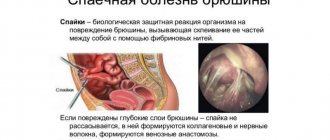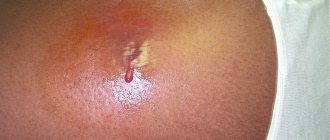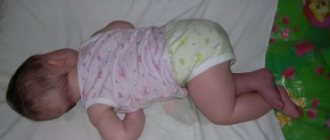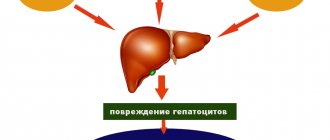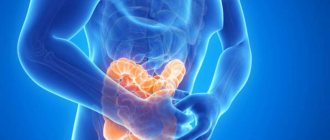Listen to this article
Despair and hopelessness are often the feelings experienced by parents who first encounter colic in their newborns. The symptoms of this disease can unsettle even the most calm mothers and fathers. During an attack, the child cries loudly and strainedly for several hours in a row, turns red, presses his legs to his stomach and twists them. Such attacks are repeated three to seven times a week.
Mom massages baby's belly for colic
Folk remedies, herbs for colic
Healing plants can be quite effective for this ailment; here are effective, well-proven recipes.
However, be careful when using herbs for colic, as individual intolerance is possible, and at the first suspicion of this, stop taking it.
Chamomile decoction . Chamomile flowers, 15 g. pour 400 ml boiling water. Bring the drug to a boil, then let it sit for an hour and strain. Give the newborn 1 tsp. three times during the day.
Dill water . Take 1 tsp. dill seeds and brew 200 ml in boiling water. Boil over low heat for about 20 minutes. Then leave for half an hour and filter. 10 ml. The resulting liquid is given to the child three times a day.
Sage tea . A tablespoon of chopped sage is poured with boiling water and left for about an hour, filtered. 1 tbsp. l. Give your child something to drink every 2 hours.
In the pharmacy you can find ready-made herbal infusions for children that help with colic - Hipp, Bebivita, Humana, etc.
Top 10 drugs from the pharmacy
Modern pharmaceuticals offer a wide selection of products to help cope with the symptoms of colic in newborns. Initially, pediatricians recommend opting for herbal remedies that help remove gases.
If they do not help, then it is better to consult a pediatrician. Most often, experts recommend drugs based on dimethicone or probiotics, which help normalize the microflora and get rid of excessive gas formation.
Lactazar
This drug is available in capsule form and contains the enzyme lactase. It is this enzyme that helps break down milk protein. Lactase is independently produced in the body, but only in small quantities in newborns, so milk is broken down slowly, resulting in excessive gas formation.
Medicine for colic in newborns: lactazar
Medicine for colic in a newborn Lactazar should be given once a day during any meal. 1 capsule is dissolved in 100 ml of breast milk or formula, given to the baby to drink, and then given the rest of the food. You can also simply dissolve the capsule in a small amount of milk and let your baby drink from a spoon.
Lactazar is a completely safe product; in rare cases, it can cause allergies. If it appears, then the medicine should be discontinued. The drug should not be given to children who have a particular intolerance to any of the components. In pharmacies Lactazar can be bought without a prescription for 400 rubles.
Rela Life
This remedy belongs to the group of probiotics and is prescribed if the baby has problems with intestinal microflora. After using the drug, the newborn’s intestines are filled with beneficial microorganisms, due to which food is easily digested, leaving no room for the development of pathogenic microorganisms.
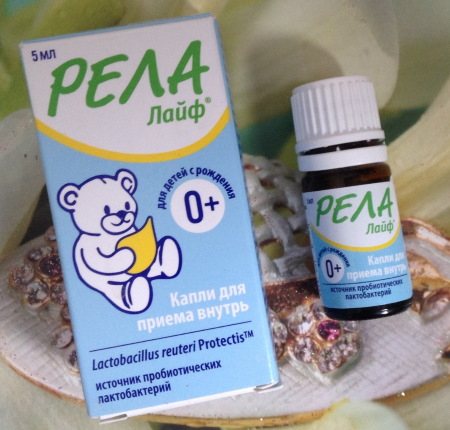
Medicine for colic in newborns: Rela Life
The medicine for colic in newborns, Rela Life, is available in the form of an oily liquid that contains live lactobacilli. Take the drops once a day, the duration of administration is regulated by the pediatrician. Before giving the product to a child, shake the bottle. You can give it from a spoon, add it to formula or breast milk.
Lactobacilli included in the drug are isolated from breast milk. That is why the medicine is completely safe for the baby and has no contraindications or unwanted effects. You can buy the drug freely at a pharmacy for 880 rubles.
Linex
Newborns do not have any bacteria in their digestive system, and this also applies to beneficial ones. That is why after feeding they often experience discomfort in the tummy in the form of colic.

To normalize digestion and relieve the child of discomfort, you will need to take bacteria. Linex is a drug that contains beneficial microorganisms that help improve digestion. Linex is produced in the form of capsules and sachets.
It is recommended to give the child the drug 3 times a day, dissolving the contents of the capsule and sachet in water or milk. The duration of treatment is determined by the pediatrician.
Taking the drug does not cause any undesirable effects. The drug can be purchased at pharmacy kiosks without a prescription for 280 rubles.
Acipol
This is a complex probiotic, available in the form of drops and capsules. Each strain of beneficial bacteria included in the drug helps to easily combat digestive disorders. Contains bifidobacteria and lactobacilli.
You need to take the drug 5 drops once a day for 2 weeks. If you need to extend the course of treatment, you should consult your doctor. You can mix the drops with water or breast milk. Before giving the capsules to the baby, you need to open them and pour their contents into the liquid.
Medicine for colic in newborns: acipol
As a result of the studies, no adverse events were identified while taking the drug. The drug is not recommended for use by children who have particular intolerance to the components. In pharmacies the drug is sold without a prescription for 280 rubles.
Sub Simplex
The medicine for colic in newborns, Sab Simplex, is available in the form of drops containing the main component - simethicone. This substance acts as an antifoam in the intestinal lumen.
It helps to break large gas bubbles into smaller ones, and they are easily absorbed into the intestinal walls and excreted. As a result, gas formation decreases and colic goes away.
Medicine for colic in newborns: sub simplex
The drug should be given to children 15 drops during feeding or immediately after it. You can add the product directly to the formula bottle or dilute it with water. Give medicine to children 2 times a day: 1 time during feeding, 2 times before bedtime. According to the instructions, in the most difficult cases, the drug can be given up to 8 times a day, but 10 drops each.
The drug should not be given to children with special sensitivity to the components, as well as to those who have congenital defects or obstructive gastrointestinal disorders. No undesirable manifestations were identified during administration. You can buy the medicine in pharmacies without a prescription for 360 rubles.
Dill water
It is simply fennel oil dissolved in water. It is also often called “pharmacy dill”. At the pharmacy, the product is sold immediately in the form of a liquid or in tea bags intended for preparing the medicine at home.
You can also easily prepare dill water yourself. You need to take 1 tsp. dill seeds, pour 1 tbsp. boiling water, leave for an hour, strain and give the child to drink instead of water 3 times a day before meals.
There are no contraindications for taking the product; dill water does not cause any unwanted effects in newborns. You can buy ready-made dill water at a pharmacy for 160 rubles.
Kuplaton
This drug is available in the form of an emulsion containing the active substance dimethicone. This substance is a kind of foaming agent, it helps to break up gas bubbles in the baby’s intestines, and as a result, all the symptoms of colic go away in a short time.
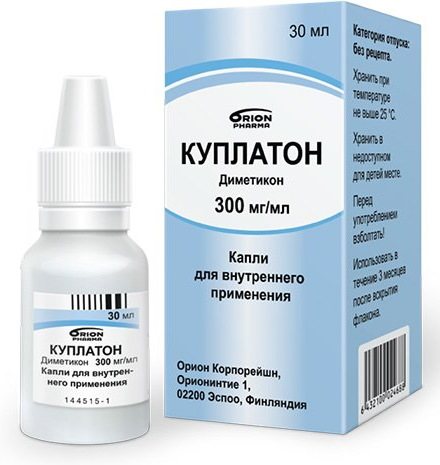
Medicine for colic in newborns: Kuplaton
Take the drug 3-4 drops 4 times a day before each feeding. The duration of therapy is determined for each child individually, depending on his condition. Shake the bottle well before taking. You can dilute the emulsion with water or simply drop it on the pacifier and give it to your baby.
The drug should not be given to children who have an allergic reaction to the components included in its composition. No undesirable manifestations were identified. You can buy medicine freely in pharmacies, the price starts from 800 rubles.
Espumisan L
This drug is produced in the form of an emulsion, which contains simethicone as an active ingredient. This substance, entering the body of a newborn, acts as an antifoam. It helps break up large gas bubbles, making them smaller, which allows them to be eliminated from the body faster.
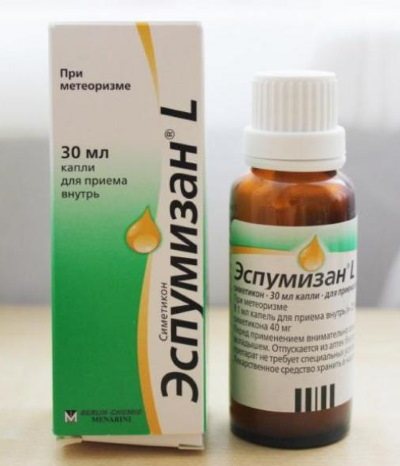
Single dose per day 25 drops, you can divide them into several doses, for example, 5 drops before each meal. The emulsion can be diluted in formula or breast milk. The duration of administration is not limited; most often it is taken until all unpleasant symptoms disappear completely.
Pediatricians do not recommend taking the drug to children who are allergic to the components. No adverse events were identified during administration. The drug is sold without a prescription for 300 rubles.
Bobotik
This drug is produced in the form of drops with the active substance - simethicone. Bobotik is a remedy that has a carminative and defoaming effect on the baby’s body.
The carminative effect is that it reduces flatulence, and the antifoaming effect is to eliminate the formation of foam. Gases in the intestines easily burst, are absorbed by the intestinal walls and are eliminated, due to which all the unpleasant symptoms of colic go away.
Take the drops immediately after meals, diluted with water. Shake the bottle well before use. Children under 2 years old are given 8 drops up to 5 times a day. Take until all unpleasant symptoms disappear.
The drug should not be taken by children under 28 days of age, with intestinal obstruction, obstructive gastrointestinal pathologies, and special intolerance to the components.
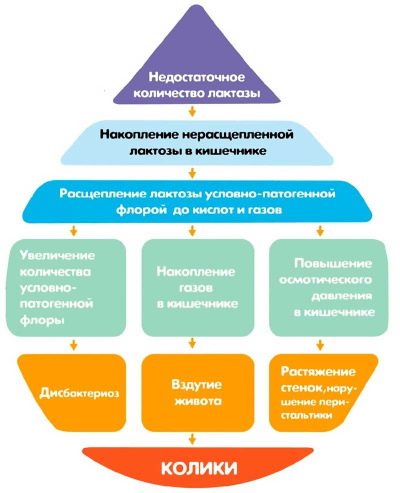
Side effects include, in rare cases, an allergic reaction. The drug is sold freely in pharmacies, the average price is 240 rubles.
Pharmacy products
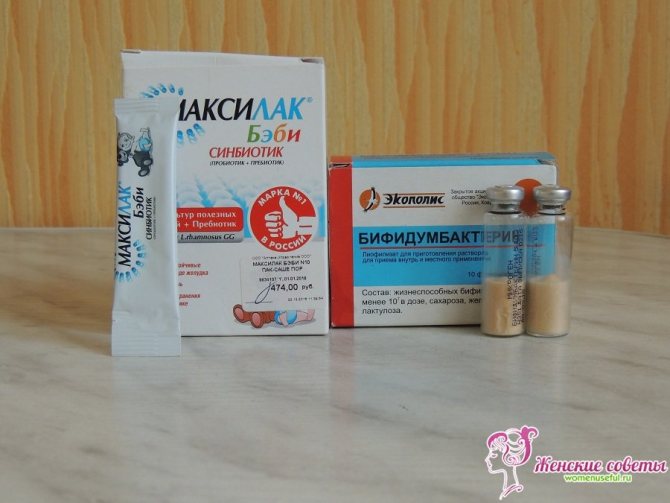
The pharmaceutical industry makes good money from families deprived of sleep and peace due to infant colic. In pharmacies there are a lot of remedies designed to relieve unpleasant symptoms. Not all of them really help. Therefore, before going to the pharmacy, you should consult with your pediatrician. Let's look at the remedies recommended by doctors here.
Let's not ignore the tummy
Massage of the baby's chest and tummy is performed while the baby is lying on his back. Starting with light stroking with the fingertips, circular movements are performed both clockwise and counterclockwise. Next, the hands stroke the baby’s tummy in a circular motion, avoiding the groin area and the area of the right hypochondrium. Massaging the tummy is very useful when the baby suffers from colic, because gentle stroking in this area not only helps strengthen the abdominal muscles, but also improves bowel function.
In general, massage for infants is an excellent prevention of hip dysplasia, and in some cases it can serve as a remedy.
Probiotics
Children suffering from colic are traditionally prescribed medications to normalize intestinal microflora. The most accessible of them is “Bifidumbacterin”, known since Soviet times. Unfortunately, its only advantage is its low cost. A noticeable effect from taking Bifidumbacterin can be seen only after long-term use. In addition, it will have to be given several times a day, which is extremely inconvenient in the case of newborn children.
IMPORTANT. Breast milk contains a huge variety of beneficial bacteria and microorganisms, which play an important role in digestion. Therefore, breastfeeding is very important in order to form the baby’s intestinal microflora. Canadian scientists have discovered that probiotics in breast milk work well against the formation of those factors that cause colic in a newborn.
“Maxilak Baby”, “Bifiform”, “Linex” - all these are more advanced analogues of “Bidumbacterin”. They contain several types of beneficial bacteria. They need to be taken only once a day, and the course duration is on average ten days.
Classification of remedies for colic in newborns
All pharmaceutical products that help a baby cope with colic can be divided into 2 main groups:
- Preventive. These medications do not guarantee that the problem will go away completely. But there is a possibility that the attacks will not be as frequent and lasting. The effect can be achieved by reducing the formation of gases. The main active ingredients of such products are dill, fennel and anise.
- To stop an attack. These drugs help during an attack; their main active ingredient is simethicone. It is thanks to it that after taking the product, tension in the intestines is relieved, gases are broken down and discomfort is reduced.
| Probiotics | The action of these drugs is aimed at establishing the intestinal microflora and populating it with beneficial bacteria that help cope with the digestion of food. |
| Enzymes | These substances, together with bacteria, help the digestive tract function properly. When there are not enough enzymes in the body, carbohydrates and proteins are broken down poorly. So, for example, in order to eliminate sugar that enters the body with milk, an element such as lactose is required. |
| Simethicone | This is a synthetic substance that is considered to be a compound of dimethylsiloxane and silicon dioxide. Medicines containing it help remove gases from the baby’s body quickly and painlessly. |
If a baby is born in the family, then the medicine cabinet must have two remedies for colic: preventive and for stopping attacks. All drugs sold in pharmacies are safe for children.
Prevention of colic
Colic can not only be treated, but also prevent new attacks with the help of preventive measures. They are mainly aimed at preventing the accumulation of gases in the child’s gastrointestinal tract. Such measures include:
- Laying on the stomach.
- Abdominal massage.
- Holding the baby in an upright position (“column”) after feeding for several minutes.
- A set of exercises aimed at strengthening the anterior abdominal wall.
- Proper nutrition of the newborn and mother, breastfeeding.
Note: find out about the correct menu for nursing mothers.
There is nothing tricky about putting the baby on his tummy. Every mother can easily cope with this simple procedure without prior preparation. The same can be said about holding the baby “in a column” after eating. He is kept in this position until belching appears. It means that the air swallowed by the baby during feeding has come out.
With massage and exercises everything is a little more complicated. Yes, parents are able to do them themselves at home, but a massage therapist or pediatrician should show the algorithm of actions.
Causes
The main causes of colic in children are:
- air entering the gastrointestinal tract during feeding . This factor may cause the baby to attach to the breast incorrectly, as a result of which he does not latch onto the nipple correctly. It is important to organize proper feeding and a comfortable position for the child in a timely manner, as well as the obligatory release of air after it. When bottle-fed, air can also get in through the nipple if the grip is incorrect or the hole is too large;
- non-compliance with the diet of a nursing mother . In order not to provoke colic in the child, it is better for the mother to avoid eating foods that cause increased gas formation. These products include: grapes, legumes, cabbage, mushrooms, kvass, watermelon, nuts, apples. Also, do not abuse foods containing wheat flour, chocolate, strawberries and citrus fruits. The digestive system of each baby is individual and it is important to monitor the baby’s reaction after the mother eats certain foods;
- improperly prepared formula (with artificial feeding). This refers to failure to follow the instructions when preparing the mixture - excessive or insufficient dilution;
- overfeeding _ It is better to feed your child less, but more often. This will avoid regurgitation and gas formation;
- The baby is rarely or not at all placed on his stomach . This position helps release accumulated gases and reduce the frequency of colic attacks.
In addition to the above, colic can occur against the background of various diseases, such as, for example: lactase deficiency, intolerance to cow's milk protein, dysbacteriosis, or the presence of an infectious process in the body.
READ ALSO: What you can eat if you have diabetes: diet and list of what not to eat
Diet of a nursing mother

. It is believed that the cause of colic in breastfed children may be poor nutrition of the mother. Indeed, already in the maternity hospital the mother is warned about the need to follow a diet, but it is aimed at preventing allergic reactions in the child, not colic.
What kind of diet should a nursing mother follow? It is not known for certain whether the mother’s diet affects the occurrence of colic in the child or not. Therefore, it is better for her to play it safe and not consume gas-forming foods: buns, sweets, whole milk, beans, peas, grapes, carbonated drinks. You will also have to give up obviously unhealthy foods:
- sausages;
- mayonnaise;
- canned food;
- any fast food.
It is better to cook food by steaming.
On forums about motherhood and pregnancy, there are posts in which mothers say that they only rely on buckwheat and water or other limited range of products. They believe that this way they relieve the child from colic. This approach is fundamentally wrong. A nursing mother must eat well and variedly, otherwise she risks driving herself to physical and moral exhaustion.
In the video below you can find out a view on mother’s nutrition from the country’s famous pediatrician, Dr. Komarovsky.
Causes of colic in infants
“There is no one, one hundred percent proven and known to doctors cause of intestinal colic in infants,” comments pediatrician Alexander Ushakov. “Various factors can lead to their occurrence.”
There are several main ones:
- swallowing air while eating;
- feeding the child too large portions of formula;
- feeding with an inappropriate formula;
- a mother’s diet containing foods that cause an allergic reaction or digestive disorders in the child.
These factors lead to the formation and excessive accumulation of gases in the baby’s intestines. They form large blisters that stretch the intestinal walls and cause discomfort in the abdomen, and often severe pain. In response to them, the child chokes on crying.
“With artificial feeding, the risk of developing intestinal colic in a child increases,” says Alexander Ushakov. — Breast milk contains special enzymes that reduce the risk of allergic reactions in the baby and digestive disorders. Artificial mixtures do not contain these enzymes. In addition, when feeding through a bottle, the baby swallows more excess air than when breastfeeding. This also increases the risk of colic.”
But it is wrong to consider artificial feeding the main cause of the problem. It often occurs in infants. The formation of excess gases can be caused by the mother's diet, which provokes food allergies in the baby, or by the natural colonization of the child's intestines by microorganisms that live on the skin of the mother's breast.

Newborn nutrition
It is customary for breastfed babies to be fed as desired. They are applied to the chest for any anxiety.
With artificially fed newborns, everything is somewhat more complicated. They are fed strictly according to the clock. The amount of the mixture should not exceed the volumes indicated on the packaging. Why is that? Breast milk is well absorbed. In addition, a breastfed baby can regulate the amount of milk he needs. The adapted formula is higher in calories, so it is much easier to overfeed your child. Overfeeding leads to gas formation and colic.
Overfeeding is not the only cause of gas. They can enter the infant's gastrointestinal tract during feeding. Therefore, when breastfeeding, proper latch is important. The baby's mouth should wrap tightly around the nipple. When feeding children with an adapted formula, it is recommended to use anti-colic bottles.
Prevention of colic in newborns usually gives positive results if the proposed methods are used comprehensively. See also tips for mothers on caring for a newborn baby.
Prevention, help and treatment
Of course, parents want to somehow alleviate the baby’s condition and help him cope with pain. Luckily, there are different ways to do this.
- It is necessary to pay attention to the peculiarities of feeding the baby and its nutrition.
- If the baby is bottle-fed, then you need to carefully choose the formula, and also prepare it strictly according to the instructions.
- The shape of the nipple for the bottle from which the baby eats plays an important role. There are regular and orthodontic nipples, the shape of which is as close as possible to the shape of a female nipple. It is best to opt for the latter.
- If after each feeding the baby spits up a lot, then overfeeding may be the cause of colic. Therefore, you need to try feeding the baby a little less.
- After your child eats, you should not immediately put him to bed. You need to hold it in a “column” for about 15 minutes to allow the air to burp.
- If a woman is breastfeeding, then she needs to monitor her diet. It is necessary to remove all gas-forming products, as well as those that enhance fermentation. These include peas, cabbage, pickled vegetables, black bread, fresh buns, sweets, kvass, and grapes.
- Feedings should not be carried out more often than every 2-2.5 hours. If the child eats more often, the food will not have time to be absorbed, and this will cause discomfort.
- Before you feed your baby, you need to put him on his tummy for a while. This strengthens the abdominal wall, which has a good effect on intestinal motility and also promotes the passage of gas. It is necessary to place the newborn on the tummy as often as possible.
Important!
If the baby does not latch onto the nipple correctly or the mother cannot determine which position is best to feed the baby, you can seek help from a breastfeeding specialist. He will help you understand all the intricacies of feeding and give useful advice. Also, do not hesitate to contact your pediatrician or nurse.

To prevent colic, you need to pay attention to feeding habits
- Special massages can help with intestinal colic.
In order to give a massage that will help alleviate the baby’s condition, you do not need to invite a massage therapist. Every mother can easily learn to perform simple manipulations on her own:
- You need to stroke the baby's tummy clockwise.
- take turns bending and unbending the baby’s legs at the knees and bringing them to the tummy;
- Turn the baby over on his stomach and stroke his sides in the direction from the tummy to the lower back.
Before starting the massage, it is best to warm the baby’s belly with a warm diaper or heating pad.
- Heat helps well with intestinal colic.
A heating pad with water or a diaper heated with an iron will greatly help relieve painful sensations. The mother can place the baby on her stomach. Such contact will calm the baby well.
You can bathe the baby in warm water. Taking a bath will have a good effect on the baby's condition. You can add a decoction of herbs such as mint, chamomile, and sage to the water.
- There are special teas that are designed to combat colic. Previously, infants were given dill water for this purpose.
- Pharmacies sell medications that help with colic in newborns. These medications relieve pain and also prevent gas formation. The most common drugs that help with colic are Espumisan, Bobotik, Bebinos. And although many mothers use them, you should definitely consult a pediatrician before giving the product to your child!
- If it is difficult for gases to pass away, a gas outlet tube is sometimes used. And in cases where the baby has not had a bowel movement for a long time, the doctor may recommend an enema.
Important!
Young mothers should also remember that their emotional state is transmitted to the child and is reflected in his well-being. Therefore, it is important to try to avoid stress and situations that can lead to it. Of course, this is difficult, especially at a time when the family is becoming familiar with the new role of parents. But you should try to organize your life so that there is time for rest. Now a woman needs the care of loved ones, their help and support. Healthy sleep, walks in the fresh air, and peace of mind will have a beneficial effect on your baby!
